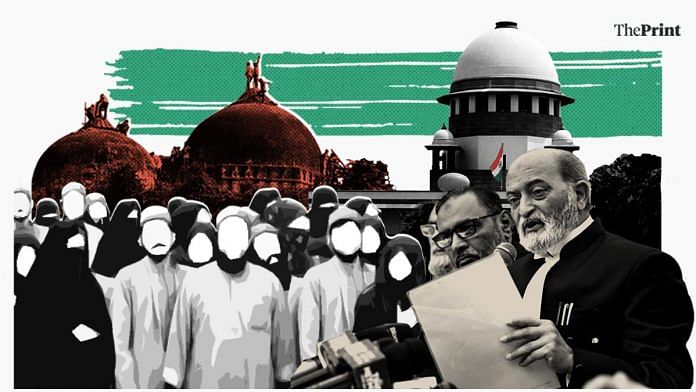The All India Muslim Personal Law Board announced Wednesday that it will file a review petition against the Supreme Court’s Ayodhya verdict before 9 December. AIMPLB secretary Zafaryab Jilani made it clear that the Sunni Waqf Board’s decision to not challenge the judgment will have no bearing on his organisation’s pledge to seek a review of the order.
ThePrint asks: Will the AIMPLB’s review petition on Ayodhya verdict help or hurt Muslims?
AIMPLB’s decision shouldn’t be looked from Hindu vs Muslim angle. It’s about provisions granted by judiciary

Shahid Siddiqui
Political commentator
The AIMPLB filing a review petition is not a question of helping or hurting the Muslim community. It is a question of applying the provisions available in India’s judicial system and upholding the rule of law. We shouldn’t look at the review petition from the Hindu versus Muslim angle.
If the review petition is valid, it shouldn’t be perceived as capable of harming something or someone. Filing such petitions can’t be termed an anti-national activity. There were parties that demanded a review of the Supreme Court’s Sabarimala verdict but that didn’t make them anti-nationals.
It is also unreasonable to expect that the Muslim community will surrender uncritically to a court verdict that concerns them. To expect this is also not in the interest of the country and the Constitution.
Therefore, I believe that AIMPLB’s review petition will not hurt anyone. The Indian Constitution allows the review of all court orders. Moreover, it will be foolish to think that the AIMPLB represents all Indian Muslims and their concerns.
On a side note, I don’t think that the Sunni Waqf Board’s decision to not file a review petition will have any impact on AIMPLB’s commitment to seek a review of the Supreme Court’s Ayodhya verdict.
AIMPLB wants to live with ideology of 1990s even though Hindus were considerate in not holding Ayodhya processions
 Swadesh Singh
Swadesh Singh
Assistant professor, Delhi University
I think that the AIMPLB’s review petition is going to hurt Muslims because it is not serving their interests. AIMPLB is certainly not the only organisation in India that represents the Muslim community. Other organisations like the Sunni Waqf Board have decided to move on. Accepting the Supreme Court’s Ayodhya verdict is in the larger interest of the country.
The fight over building a Ram Mandir in Ayodhya has been a long one. The Supreme Court’s order gave a closure but if people continue to rake it up, certain unnecessary questions will start gaining currency. For instance, people claim that Mughals destroyed thousands of temples. Filing a review petition will only legitimise such claims but India needs to move forward.
One should also question the constitutional validity of the AIMPLB raising this concern. One can’t raise these concerns after the verdict just for the sake of playing dirty politics.
Hindus were considerate in not choosing to hold any processions after the Ayodhya verdict because they felt that Muslims might feel defeated. AIMPLB wants to live with the ideological values of the 1990s, but it can’t because the country has moved on. There are so many other important issues that need to be addressed; one must not fall prey to this again.
AIMPLB knows Muslims aren’t bothered about Ayodhya anymore. This is its way of gaining media attention

Hilal Ahmed
Associate professor, CSDS
The AIMPLB’s decision to file a review petition will contribute to the existing anti-Muslim discourse in India in two ways. First, it will definitely legitimise the dominant perception that the Ram Janmabhoomi-Babri Masjid issue was and will remain a Hindu-Muslim conflict. It will also reassert the false impression that Hindus are represented by Hindutva forces while Muslims are represented by the AIMPLB.
Second, this move will eventually also be understood by common Hindus as an example of Muslim rigidity and fundamentalism. I think that the AIMPLB is aware of the fact that Muslims are not bothered about the Ayodhya issue anymore. It seems to me that this is the AIMPLB’s way of gaining media attention.
The AIMPLB is actually trying to mislead the Muslim community just the way it did in the 1990s when it began to propagate that the Babri Masjid issue was purely a legal one and that it would abide by the court’s verdict. However, now it is arguing that this is an emotional issue and so wants to use the legal resources available to address the Muslim emotion. In reality, the AIMPLB is trying to assert its status as the representative body of Indian Muslims.
Muslims have gracefully accepted SC’s Ayodhya verdict. AIMPLB’s review petition is unnecessary

Zafar Sareshwala
Former chancellor of Maulana Azad National Urdu University
If the AIMPLB files the review petition, nothing substantial is going to come out of it. It is going to be the same set of judges hearing the petition who announced the Ayodhya verdict. What additional facts could possibly be explored?
I think the Muslim community has accepted the order gracefully. Some points from the judgment will add weight to this argument. First, the Supreme Court, by citing one of Archaeological Survey of India’s reports, did not explicitly state there was a temple underneath the Babri Masjid. Second, the top court categorically said that the placing of Lord Ram’s idols in 1949 was illegal. Third, it also stated that the demolition of Babri Masjid was illegal. Finally, it also allotted five acres of land to Muslims to build a mosque.
Muslims have clearly got over this issue now. They have set their priorities straight and intend to make education their primary focus. Education has now become a silent revolution among Muslims in India outside of the media glare.
I am not questioning the AIMPLB’s action, but I still think that the review petition is unnecessary. It is only on social media platforms that the Hindu vs Muslim friction exists, but the steam of acrimony has evaporated long ago.
Justice for minorities can’t be contingent on goodwill of majority. AIMPLB wants to be on right side of history

Fatima Khan
Reporter, ThePrint
The AIMPLB has maintained right from the time the Ayodhya verdict was announced on 9 November that it will file a review petition against it. Subsequently, sources from within the AIMPLB said that they are fully aware the Supreme Court will reject their petition in all likelihood. But, according to the Board, the point of filing a petition is to ensure that it knocks on all doors of justice and is on the right side of history.
Political commentators often try and separate the incident of Babri Masjid’s demolition from the issue of the land dispute itself. But for Muslims, the two issues are irrevocably interlinked. There is no question of healing for the Muslim community unless those behind the desecration of Babri Masjid are punished.
The argument that filing a review petition will only rekindle bitter sentiments is a disingenuous one. In a recent statement, 100 Muslim artists and activists have made a similar faulty argument against filing the petition: “In choosing not to pursue the matter further, Muslims stand to gain the goodwill and empathy of the non-communal millions from the majority community”.
Justice for minorities shouldn’t be contingent on the goodwill of the majority. The Indian Constitution exists for a reason — to ensure justice for everyone, not just for those who have managed to “earn the goodwill of the majority”.
Also read: AIMPLB’s Ayodhya review petition will be futile. Muslims must accept verdict gracefully
By Kairvy Grewal, journalist at ThePrint




Muslims accept it we are a Hindutva nation.
One Nation one Folk, One Religion.
I too am thinking of converting to Hinduism, as I live in Hindustan.
I appeal to my Brahmin brothers to accept Muslims into the Brahmin fold when we convert.
Allow your Brahmin daughters to marry ex muslims as we become Hindus in our millions, just as during Mughal times we married Rajput women, but with the consent of your daughters off course.
I am more then willing to place an idol of Shri Ram in my House.
Brahmins you too can marry our beautiful daughters if they consent.
Together we can all live happily, with Brahmin Muslim, frequent inter marriage
Jai Siri Ram
PERFECT SOLUTION FOR EVERYBODY!
“Supreme Court is supreme, but not infallible”, a former CJI. Even though the verdict is unanimous, there are former Supreme Court judges who are critical of the rulings.
AIMPLB is trying to apply the provisions available in Indian judiciary within the boundaries of Indian Constitution that ensures justice for everyone. If the Supreme Court feels the petition has no merits, it can reject it. Hence, review petition should not be construed as helping or hurting Muslims. It’s just a judicial process.
AIMPLB’s decision to go for review will keep the mandir / masjid dispute alive and it will only benefit BJP.
Have often wondered how one individual can claim to represent the views of 200 million people. Heck, I cannot do that even for the four members of my family.
Perhaps neither. However, that is not the point. Not contesting this judgment – which to my simple understanding is one sided – would show complete funk. The sort of docility Dalits in India showed for hundreds of years, accepting that they were not full citizens, the equal in every sense of their compatriots. All the infirmities in this verdict should be carefully enumerated and brought on record, never mind that the review petition will be rejected. 2. Also, meaning no disrespect to the desire to render “ complete justice “ vide Article 142, the offer of five acres of alternate land should be gracefully declined.